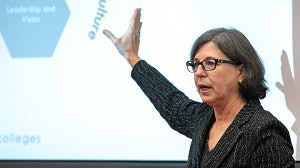Equity initiatives only work if university leaders are on board. At least that’s the principle behind the Racial Equity Leadership Academy, a new program announced at the opening plenary of the 16th annual Achieving the Dream conference on Tuesday.
Achieving the Dream, a non-profit focused on higher education reform, partnered with the University of Southern California (USC) Race and Equity Center to create an intensive three-day institute for community college leaders with funding from the Kresge Foundation.
 Dr. Karen A. Stout
Dr. Karen A. StoutDr. Shaun Harper, executive director of the USC Race and Equity Center, expressed “tremendous excitement and optimism” for the leadership academy as a “substantive, multidimensional strategy to improve racial equity at community colleges.”
“I am confident that numerous instructive and inspiring models of excellence will emerge from our collaboration,” he said in a statement.
This July, 40 people from ten selected colleges will gather in Los Angeles, California to work through a curriculum of eight modules designed to give them a foundational understanding of racial equity with an emphasis on topics that benefit from thorough, face-to-face discussions.
At the end of the three days, leaders will develop one central project to institute on their campuses, which can range from diversifying the faculty to tackling campus climate problems to boosting transfer rates for minority students.
Over the course of the year, participants will work on bringing their campus-specific equity goals to fruition, with monthly virtual meetings with Achieving the Dream and USC Race and Equity Center coaches for guidance. At the next Achieving the Dream conference – which will take place in Orlando, Florida in February 2021 – each school will present on its progress.
The Racial Equity Leadership Academy is intended to engage different kinds of campus leaders, requiring each school to participate in teams of four comprised of the president or chancellor, a faculty member, a cabinet-level student affairs officer or diversity officer and a senior academic leader, like a provost or vice provost.
For Dr. Karen A. Stout, president and CEO of Achieving the Dream, equity has always been “at the heart of” the organization’s work, so the leadership academy feels like a natural fit.
“We recognize that access and success are impacted by the effects of structural racism and systemic poverty,” she said. “We say it very directly, and we talk about the inequities manifesting themselves as the unintended or direct consequences of unexamined institutional or social policies.”
But after years of work in higher education – Achieving the Dream started in 2004 and Stout joined in 2015 – she found that university leaders were crucial to shaping and changing those policies, and without their collective buy-in, little could get done.
The goal of the Racial Equity Leadership Academy is for university leaders to emerge with “an aligned vision,” Stout said. “In examining colleges that are successful in accelerating student success outcomes, we know that the leadership team has to have a shared vision, a shared purpose and a shared sense of urgency.”
That level of coordination doesn’t necessarily happen on its own, so an “immersive experience” in a “safe place” off campus can help leaders get on the same page, she added.
But to make sure that’s the case, the initiative incorporates a “360 kind of assessment strategy” to measure its initial success for future cohorts – daily program evaluations from academy participants, reports from coaches on their teams’ progress and self-evaluations from university leaders comparing their baseline data to their goals.
“It’s hard to move forward substantive change in a year,” Stout said. “But you can at least set the groundwork for it.”
The announcement of the new leadership academy came at the tail end of the Racial Equity Institute, a packed day of workshops for higher education leaders before the Achieving the Dream conference begins in earnest on Wednesday. Speakers presented and facilitated small group discussions on a variety of equity-centered topics from assessing student success using data and analytics to developing stronger K-12 partnerships.
The timing is fitting, since the partnership between Achieving the Dream and the USC Race and Equity Center was born out of last year’s equity institute, where USC’s Harper served as the keynote speaker.
In Harper, Achieving the Dream leaders found “a common desire” to continue the conversations that began at the equity institute and support community colleges willing to take a collaborative approach to racial equity work, Stout said.
When applications for the Racial Equity Leadership Academy close on March 18th, Stout said she’s excited to see which colleges in the Achieving the Dream network choose to be a part of it.
“These will be colleges that are already very serious about their equity work,” she said, “that really want to go deeper and fundamentally really do want to dismantle the structural and systemic barriers within their own institutions, the policies that have disadvantaged students of color.”
Sara Weissman can be reached at [email protected].















